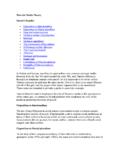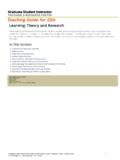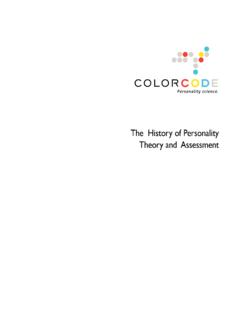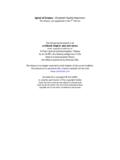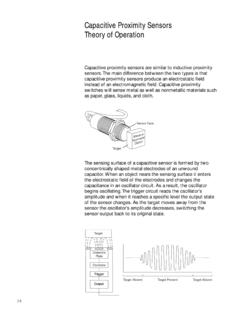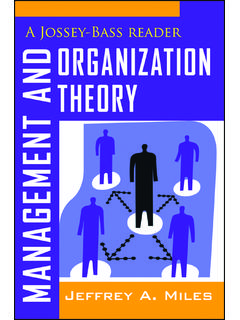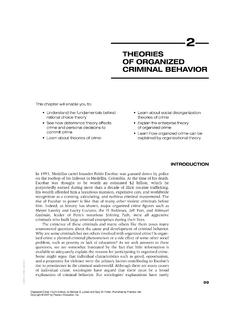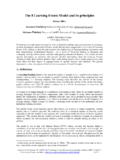Transcription of Name Period Primes Number Theory - AGMath.com
1 Number TheoryPrimesName_____ Period _____A Prime Number is a whole Number whose only factors are 1 and itself. To find all of theprime numbers between 1 and 100, complete the following exercise:1. Cross out 1 by Shading in the box is neither prime nor composite. It has only 1 factor - Use a forward Slash \ to cross out all multiples of 2, starting with is the first prime Use a backward Slash / to cross out all multiples of 3 starting with Multiples of 4 have been crossed out already when we did # Draw a Square on all multiples of 5 starting with 10. 5 is Multiples of 6 should be X d already from #2 and # Circle all multiples of 7 starting with 14. 7 is Multiples of 8 were crossed out already when we did # Multiples of 9 were crossed out already when we did # Multiples of 10 were crossed out when we did #2 and # of the remaining numbers are many prime numbers are left between 1 and 100?
2 _____12345678910111213141516171819202122 2324252627282930313233343536373839404142 4344454647484950515253545556575859606162 6364656667686970717273747576777879808182 8384858687888990919293949596979899100 Answer: Use your chart for 51 prime? If not, what are its factors? _____Is 59 prime? If not, what are its factors? _____Is 87 prime? If not, what are its factors? _____Is 91 prime? If not, what are its factors? _____Number TheoryDivisibility RulesName_____ Period _____There are some easy tricks you can use to determine if a Number is divisible by 2, 3, 4, 5, 6,8, 9 and Number is divisible by:2 - if it is - if the sum of its digits is divisible by - if the Number formed by the last 2 digits is divisible by 4. (ask me why this works)5 - if the ones digit is 5 or - if it is divisible by 2 AND 3. (All even multiples of 3.)7 - there is no good trick for - if the Number formed by the last 3 digits is divisible by 8.
3 (ask me why this works)9 - if the sum of the digits is divisible by - if the last digit is a : We will learn this trick next. It is more : Write yes or no in each whether 21,408 is divisible by:2 - ____6 - ____3 - ____8 - ____4 - ____9 - ____5 - ____10 - ____Determine whether 1,345,866 is divisible by:2 - ____6 - ____3 - ____8 - ____4 - ____9 - ____5 - ____10 - ____Determine whether 222,222,225 is divisible by:2 - ____6 - ____3 - ____8 - ____4 - ____9 - ____5 - ____10 - ____Number TheoryTrickier Divisibility ProblemsExamples:1. What is the smallest 4-digit Number that is divisible by 2, 3, 4, 5, 6, 8, 9,and 10?Reasoning: The Number must end in zero. Lets assume that to be the small-est it should start with a 1. Since the digits must add up to 9, the lastthree digits must add up to 8. 1,080 is the smallest four-digit integerdivisible by 8 and second method will be explained in the first practice problem Using only 1s and 2s, what is the smallest integer you can create which isdivisible by both 3 and 8?
4 Reasoning: The last digit has to be a 2. Since 12 and 22 don t work, weneed a 3-digit Number that is divisible by 8. 112/8 = 14, but it is notdivisible by 3. Unfortunately, 122, 212, and 222 are not divisible by 8 sowe must go to a 4-digit Number that ends in 112 and whose digits are amultiple of 3. The only 4-digit Number that works is 2,112 (we want thesum of the digits to be 6) so it is the :1. What is the smallest positive integer that is divisible by 2, 3, 4, 5, 6, 8, 9,and 10? (There is a good way to do this without guess-and-check).2. The digits of a Number are all 8s, and it is divisible by 9. What is the small-est positive integer that fits this description?3. What is the smallest positive integer that is divisible by 2 and 3 that consistsentirely of 2s and 3s, and has at least one of each?4. What is the smallest 5-digit integer divisible by both 8 and 9?
5 1. 3602. 888,888,8883. 2,2324. 10,008 Number TheoryDivisibility Rule: ElevenThe divisibility rule for 11 is seldom taught in regular :First, take a moment to multiply several numbers by 11:5041723abcdx11 x11 x11 You should see some patterns with the the final example, the digits become: a a+b b+c c+d dIf you add the alternating digits you geta a+b b+c c+d dthe same find out if a Number is divisible by eleven:Sum the alternating digits. Subtract these two numbers. If the result is zeroor is divisible by 11, the Number is divisible by : Determine if each Number is divisible by 11 without a calculator:1. 4952. 9,8353. 14,8064. 918,291 Practice: Determine if each Number is divisible by 11 without a calculator:1. 3,9512. 987,6543. 14,2564. 65,768 Harder Practice: Solve each without a What digit could fill-in the blank if 89_43 is divisible by 11?
6 2. What five-digit multiple of 11 consists entirely of 2s and 3s?3. What is the largest five-digit multiple of 11?4. What is the remainder when you divide 1,234,567 by 11? Number TheoryDivisibility PracticePractice:Solve each using what you have learned about What digit could be used to fill in the blank and make the followingnumber divisible by both 3 and 8?45,2_8_____2. What is the smallest three-digit prime?_____3. How many multiples of 3 less than 1,000 use only the digits 2 and/or 360 is divisible by both 8 and 9. How many integers less than 360are also divisible by both 8 and 9? (hint: First find the smallestinteger that is divisible by both 8 and 9.)_____5. A three-digit integer is divisible by 9. If I subtract the tens digit fromthe hundreds digit, I get the ones is the largest Number that meets these conditions?_____6. There are two ways that the digits 1, 2, 3, and 4 be arranged tocreate a four-digit multiple of 8.
7 Find them both. _____ _____7. Consecutive integers are placed in order to form a three-digitinteger. The integer will ALWAYS be divisible by what prime Number ?_____8. For the Number ABC, each distinct letter represents a different ABC, CAB, and BCA are all divisible by 6 and 9, find the valueof ABC + CAB + What is the largest seven-digit Number that contains each of thedigits 1 through 7 and has the property that the sum of any twoconsecutive digits is a prime Number ?(source: MATHCOUNTS 2000 National Team Round)_____Name_____ Period _____Number TheoryQuiz: DivisibilitySolve:1. How many of the following integers are factors of 12,345?2, 3, 4, 5, 6, 8, 9, _____2. What Number could fill-in the blank to make 56,74_ divisibleby both 3 and 4?2. _____3. How many prime numbers are greater than 20 but less than 40?3. _____4. Using only the digits 1, 2, and 3 with at least one of each, what is thesmallest integer that can be created which is divisible by 8 and 9?
8 4. _____5. Using only the digit 2, how many 2s must be used to create an integer thatis divisible by both 9 and 11?(Example: Using four 2s: 2,222 is divisible by 11 but not 9.)5. _____6. What is the remainder when 456,654,465,645 is divided by 6?6. _____7. The digits 0,3,6, and 9 are used to create the smallest integer that is divisibleby 2, 3, 4, 5, 6, 8, 9, 10, and 11. What is this integer?7. _____Name_____ Period _____Number TheoryQuiz: DivisibilitySolve:8. The digits 5, 6, and 7 are arranged to create a three-digit of the following cannot be a factor of the Number formed?(There may be more than one answer, list all that apply.)2 3 4 5 6 8 98. _____9. Using two 5s and two 6s, it is possible to create four 4-digit numberswhich are divisible by 11. What is the sum of these four numbers?9. _____10. Each of the digits 0-9 is used exactly once to create a ten-digit integer.
9 Findone of the many ten-digit numbers which uses each digit once and is divisibleby 8, 9, 10, and _____Name_____ Period _____Number TheoryDivisibility ComboRules:Each player gets 6 cards, each with a single hand, players goal is to find a Number using at least 3 of their 6 digitswhich meets the divisibility :You hold 1,4,4,5,7 and : Divisibility by 3 and answer: 8,415 4,875 :You hold 1,2,3,3,8 and : Divisibility by 3 and you find a solution?Sometimes it will be impossible using the cards you have. After a player getsthree combos, (s)he wins the round and everyone gets a new a 3+ Digit Number that is Divisible by:62 and 33 and 45 and 62 and 113 and 118 and 94 and 6115 and 83 and 84 and 994 and 52 and 115 and 93 and 102 and 3 and 5 Number TheoryMore Work With OnesUse a calculator to determine each of the following perfect squares:(you should know the first two)12 =112=1112 =1,1112 =11,1112 =.
10 After this your calculator will probably start giving you weird !1. Explain why this pattern does what it does.(hint: try writing the multiplication out).2. Predict the value of 111,111,11123. Why does the pattern start to break up at 1,111,111,111?A similar problem:Pick any three-digit Multiply your Number by Multiply your answer by Multiply that answer by anything?Think!1. Can you explain why this happens every time?2. What Number would you multiply a four-digit Number by to create the sameeffect?3. Pick any four-digit Number and multiply it by 73, then multiply that answerby 137. Without checking on your calculator, do you know what 73 times137 is?4. The following trick works on the same principle:Take the first three digits of your phone Number . Multiply by 80. Add by 250. Add the last four digits of your phone Number . Add the lastfour digits again.



